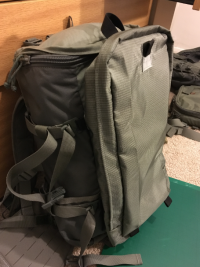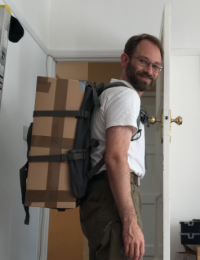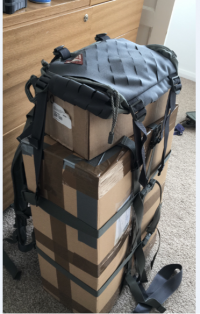I'm a pack addict, I admit! I need a new pack every now and then, some of them I sell, some stay with me for longer. Umlindi has a good chance to belong to the latter group... got it almost a year now and don't plan to part with it. Purchased it directly at HPG online store, with my own money of course. The details / weight, versions, accessories, etc. you can find at HPG website here: http://hillpeoplegear.com/Products/tabid/762/CategoryID/3/ProductID/9/Default.aspx
Now my review.... enjoy!
Hill People Gear (HPG) is a small company based in Western Colorado. It was founded by brothers Scot and Evan Hill. The Hills are real outdoorsmen, hunters, trappers, and backpackers. They’re also all around great guys who share their passion for designing and making awesome outdoor gear. While the Hills and Hill People Gear are best known for their iconic Kit Bags (chest pistol bags designed for outdoor use), they also have some other interesting packs in their portfolio.
The Umlindi pack (which Scot and Evan designed) is made entirely in United States by one of the most respected tactical nylon tailoring companies, First Spear. Knowing this alone, you can rest assured the quality of the Umlindi ($220) is top-notch and not compromised by cutting corners to reduce cost. That being said, be prepared to pony up as there is no such thing as a free lunch!

Packs with 20-30 liters of volume are probably the most crowded backpack segment. However, most of the packs follow almost the same construction principles. It’s a sack with two shoulder straps usually with some slight external design differences. So when I came across the Umlindi, which was really very different, I was even more than excited to try it out! This article discusses the pack from the perspective of a backpacker who enjoys the wilderness, mountains, and bushcraft. I also often have my two kids with me during summer family hikes. The Umlindi, which means ‘The Guardian’ in Zulu, was originally designed as a pack for a South African rhino poaching interdiction unit – something a little different from my adventures. If you want all the technical specs on the pack, you’ll find them here.
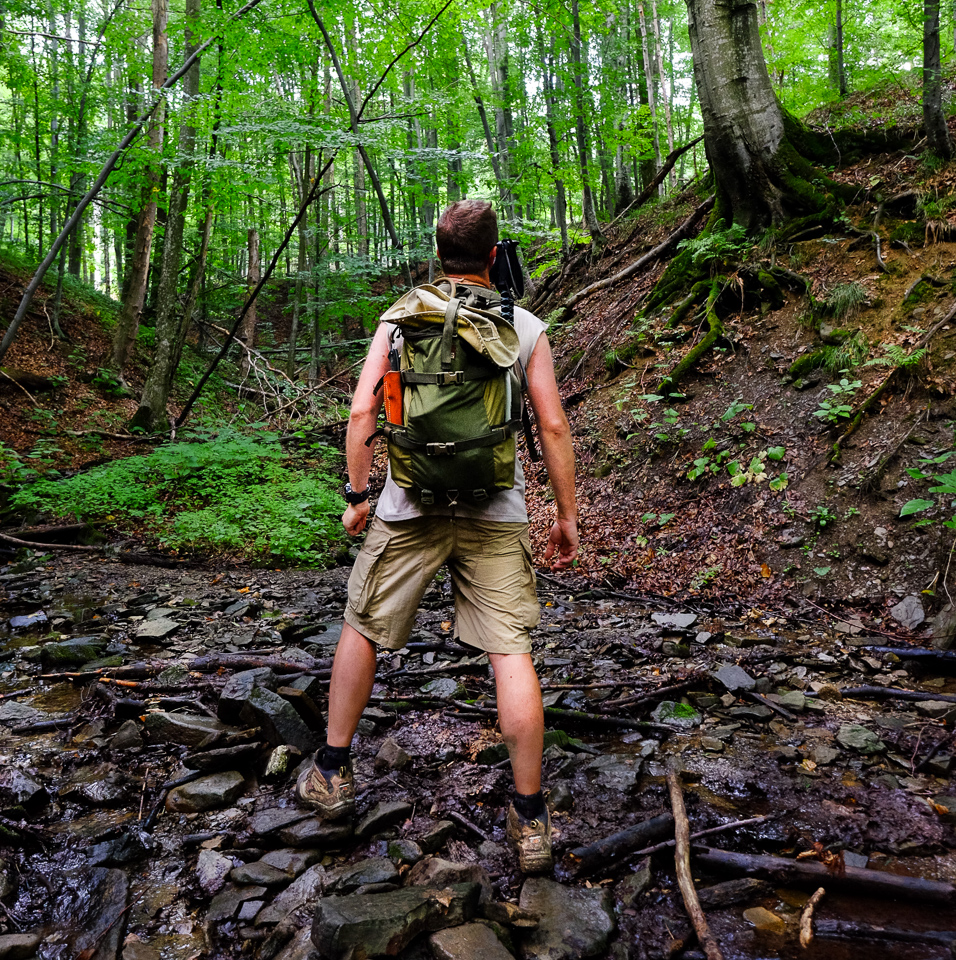
The big difference between Hill People Gear packs and everything else on the market is their harness system. In almost all of the other packs, you will find two separated shoulder straps attached to the pack. Hill People Gear decided to go with a one-piece super wide harness, which is connected to the pack at the top central part of the pack and goes around neck and shoulders. I had been carrying a HPG Tarahumara for about a year before getting the Umlindi. I already knew what to expect – pure comfort!
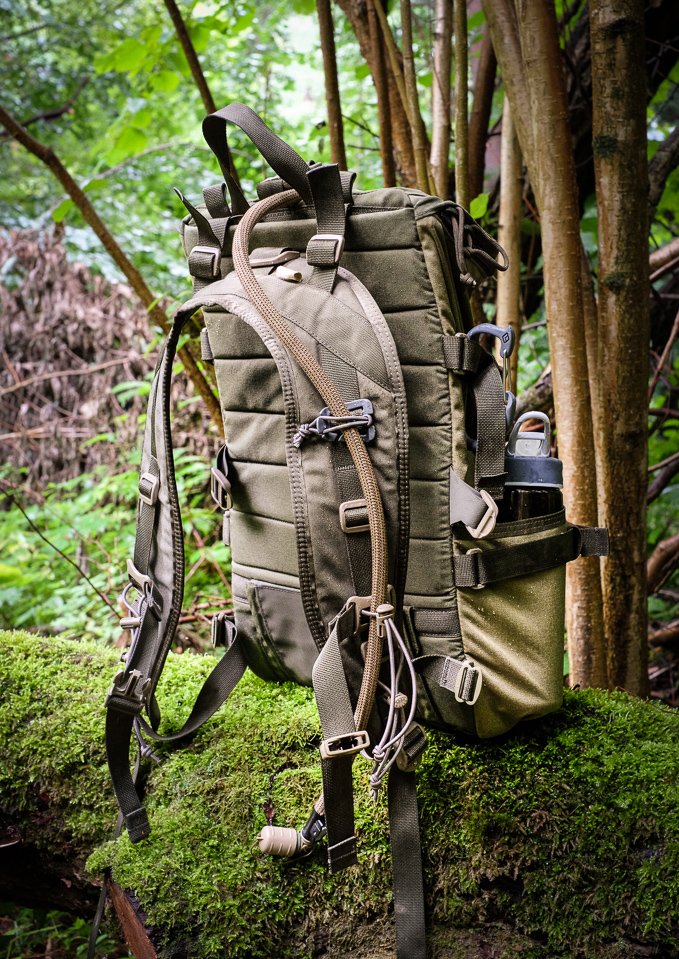
You don’t have to take just my word on it either. I’ve seen quite a few backpackers using other high-end packs upgraded with a HPG harness. The harness is not heavily padded, but it doesn’t need to be. It’s really wide and spreads the load out over the contact surface, which is considerably bigger than your standard shoulder straps. It all comes down to the physics. A bigger contact area equals lower pressure, which in turn equals less pounds per square inch. The end result of the equation is comfort! The HPG harness includes an adjustable sternum strap and two shock-cord loops on each shoulder (dedicated to carry small items like 0.5 L bottle or energy gel). I use them also for my camera lenses – that gives me quick one-hand access to change my lens on the fly, and it rides really secured. Of course, you have to check it out and decide for yourself.
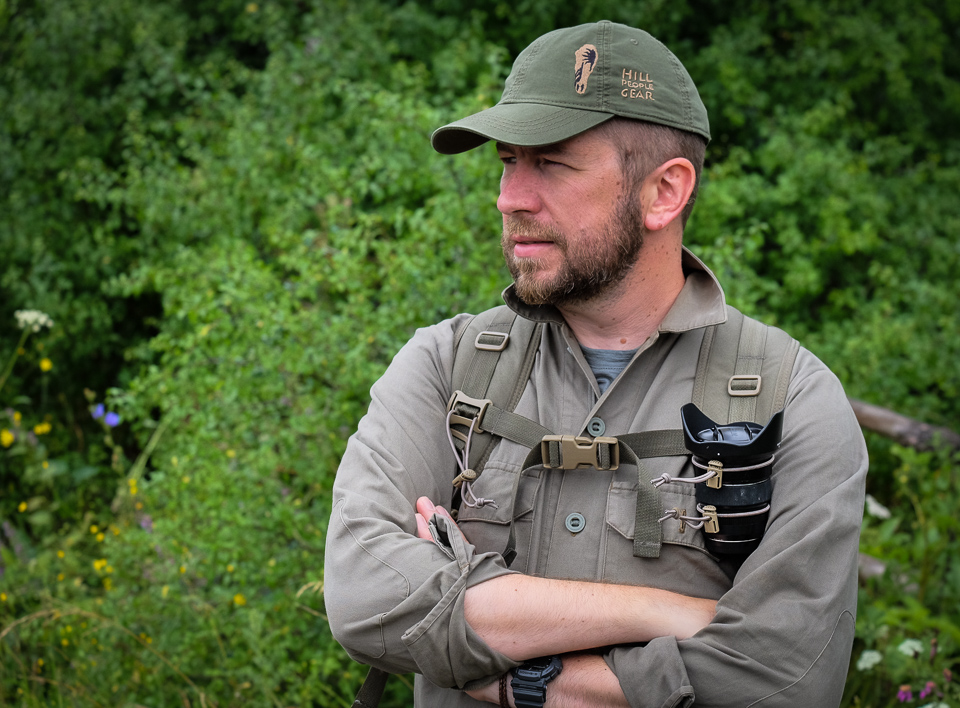
The pack itself has a simple but well thought-out construction. It’s a medium-sized sack with just one small internal pocket (which is good for flashlight, spork, energy bars and other quick access items). It is fitted with flat lid and heavy-duty zippered closing. The internal flat pocket is just an open slot. In fact, I don’t recommend it for wallet or other valuables as they may come out. There are two side pockets on the outside of the pack which are dedicated for water bottles, a knife, small hatchet, folding saw, kindling, etc. They are big enough even for 1-QT USGI canteen. Still though, I prefer the lightweight, flat collapsible bottles like the ones Platypus or GSI that don’t push or protrude to the inside along with compromising critical internal storage volume.
All in all, think of the pack as a modern interpretation of a classic klettersack with some additional features and solutions. Inside, on the back, you will easily notice polymer frame sheet with aluminum central stay, which can be bent anatomically to fit your back. There is also a set of 4 internal attachment loops for admin pockets and/or water bladder and hydration port. Pro-tip: with a pair of grimlocks you can comfortably attach admin pouch inside, which gives you all organization you may need. The Kifaru Admin Pouch works best for me.
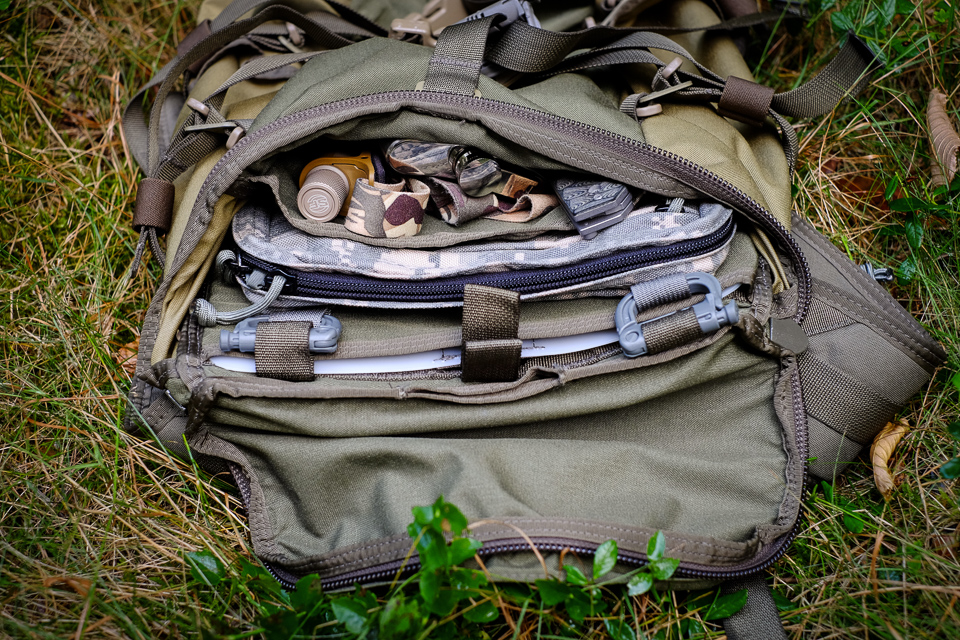
The back of the pack is also as simple as it gets. It’s just a hypalon reinforced lumbar area and flat back with some padding, behind which you’ll find one big, flat pocket. The pocket can be used for flat quick-access items such as maps or working gloves. You could even add a short lever-action rifle. I’ll take a Grizzly Custom “The Backpacker Scout” in classic 30-30, please! The lightly padded flat back panel, combined with the unique HPG harness, works surprisingly good as a team in my opinion.
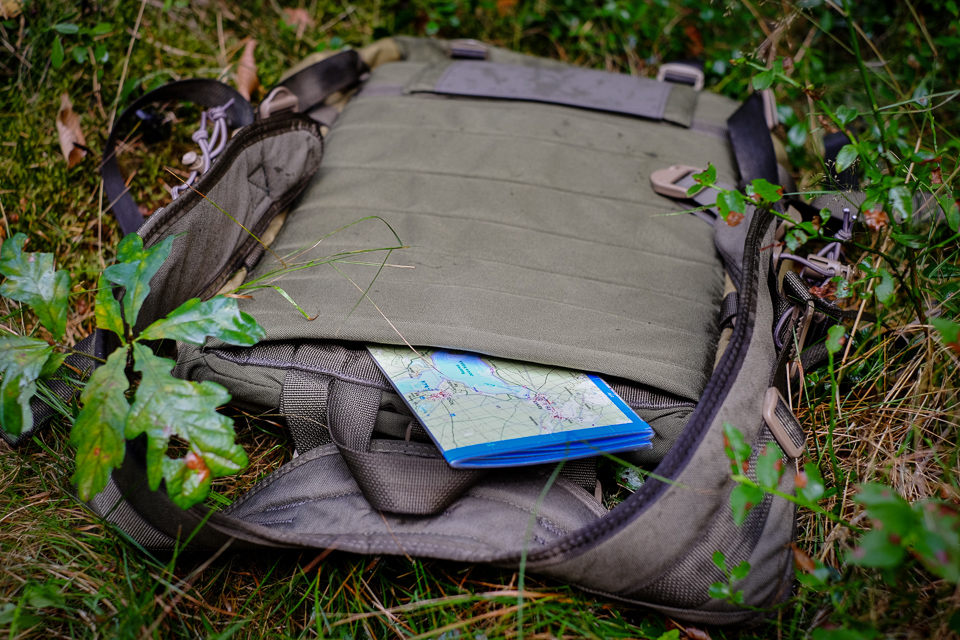
The pack’s ventilation is not perfect of course, but this kind of suspension keeps the pack’s center of gravity close to the back, which is something that I like a lot. In my last 30 years of my hiking, backpacking, and scouting experience, I found one universal truth – in a hot summer day, no ventilation is ever good enough. You’re going to sweat. For me, in a pack of this size, ventilation is not the key priority, overall comfort and compactness is. If the weather demands any additional layers over my merino t-shirt, the issue disappears completely and is a moot point. So I see it as a conscious design choice. It is a modern Klettersack, remember?
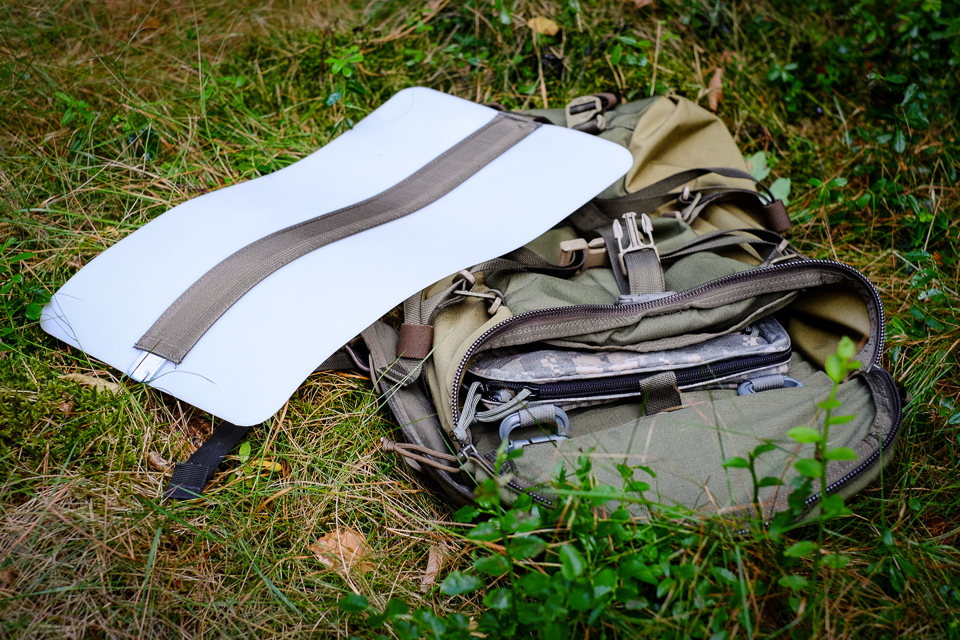
In the lumbar area, there is a dedicated space for a standard velcro-backed waist belt. HPG offers really nice add-on called the Prairie Belt. However, this is my ‘fast-n-light’ pack so I decided to go without the waist belt. I don’t regret it either as the wide harness distributes the pack’s weight comfortably on my shoulders. Plus, without the waist belt, I have surely better ventilation of my back as well. Again, keep in mind that it’s a small pack. I don’t expect more than 25 lbs on my back when carrying it, and usually it’s up only to 15 lbs.
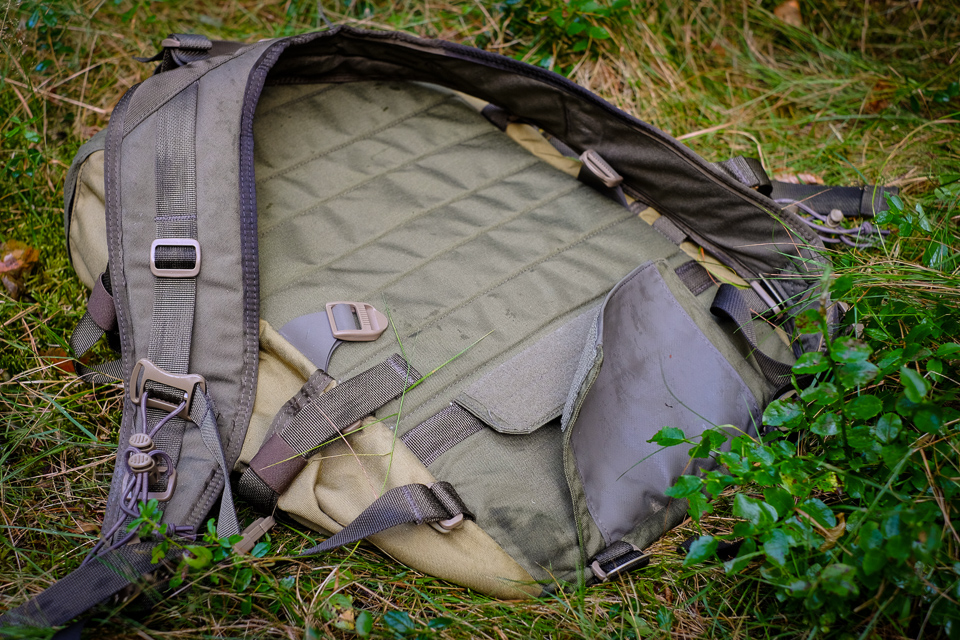
Here we get to the key point! The one feature, which really sets this pack apart, is the compression strap system. It’s a FULL SYSTEM, not just your old Klettersack side straps. It starts with a single adjustable strap on top of the pack with a side-release ‘Fastex’ buckle on one side and G-hook plus small keeper on the other. It can be used to strap on a rolled jacket or hat, but I use it often to strap down a 5L waterproof bag with a fleece jacket and merino shirt rolled inside.
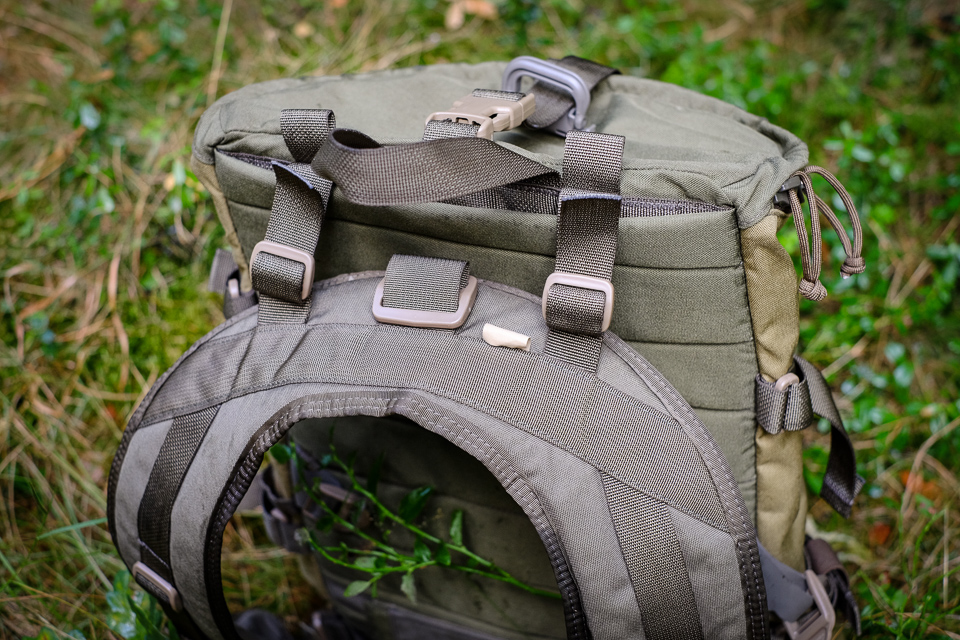
On the bottom of the pack you’ll find a pair of straps with webbing keepers and metal G-hooks (strong and low profile). They are long enough to strap a sleeping pad, small tent or a tarp to the pack. There is also a small adjustable paracord loop at the bottom to attach an ice-hatchet or similar ice climbing tool, which you can then secure with main strap. It would work for a tomahawk as well. Last but not least, there are no drain holes! In my years of experience, they usually just let water in.
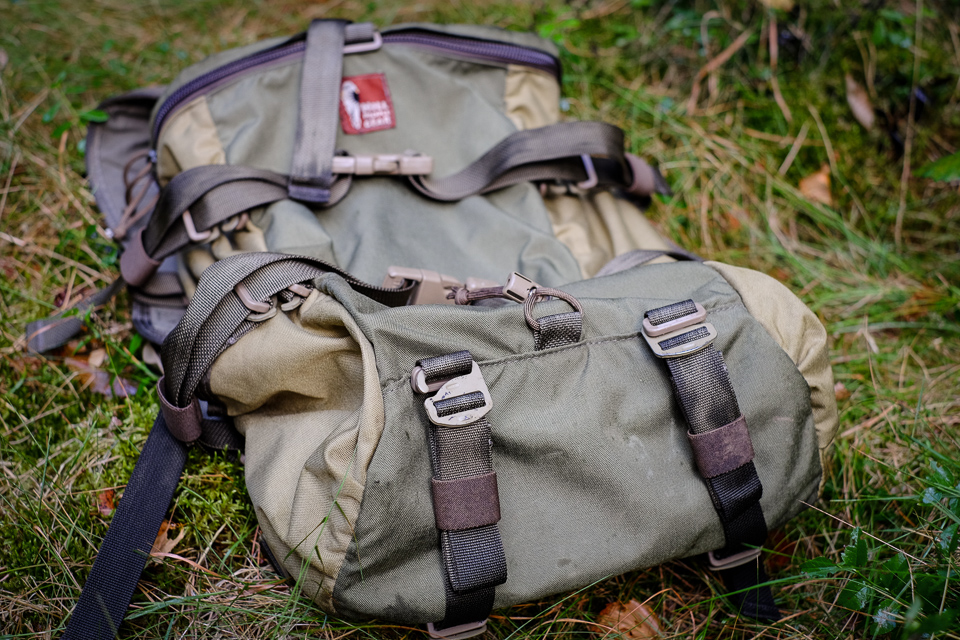
The main compression straps are genius! The unique construction allows you to use the side compressions independently from the back compression sections, but it’s still just ONE long strap. Via a combined system of G-Hooks, loops, and Fastex buckles, you can set the compression/tension of each section separately. Of, if your needs are different, you can combine two sections or all three sections together to strap even the biggest items to your pack. I managed to secure with side straps: water bottles, hiking poles, camera tripod (full size), crampons, all sorts of sticks, side pouches, rolled hardshell, and even a 2-lb outdoor axe. Also, it was no problem with bigger items such as full size recurve bow and quiver, 10-inch Chris Reeve bush knife, and even a bullpup carbine. With the flexibility of multiple configurations, this is the best compression straps system I’ve ever had on any pack!
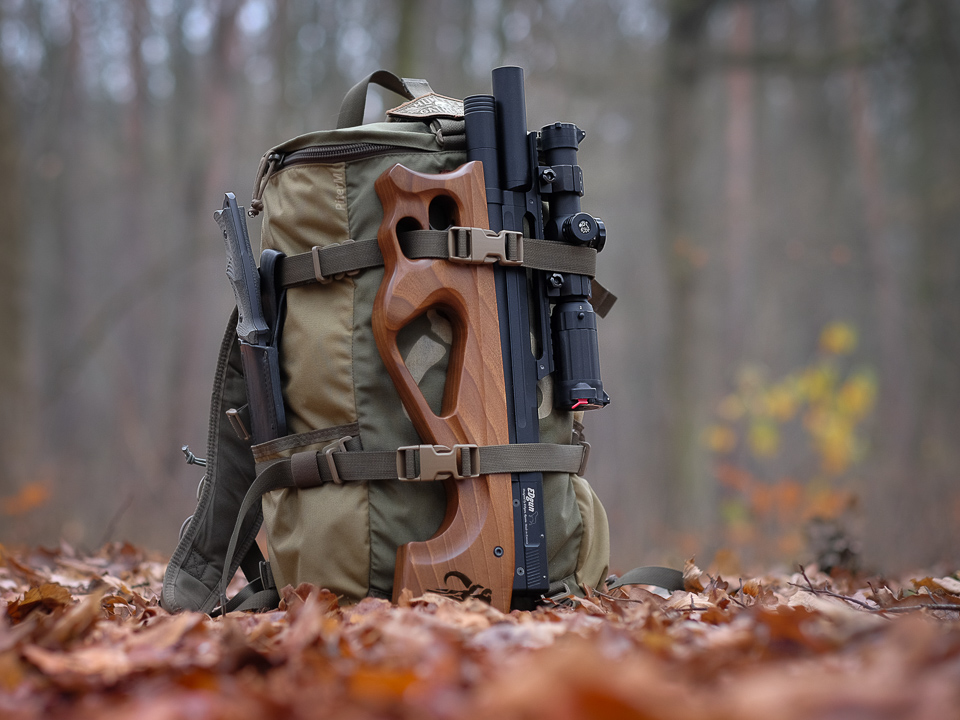
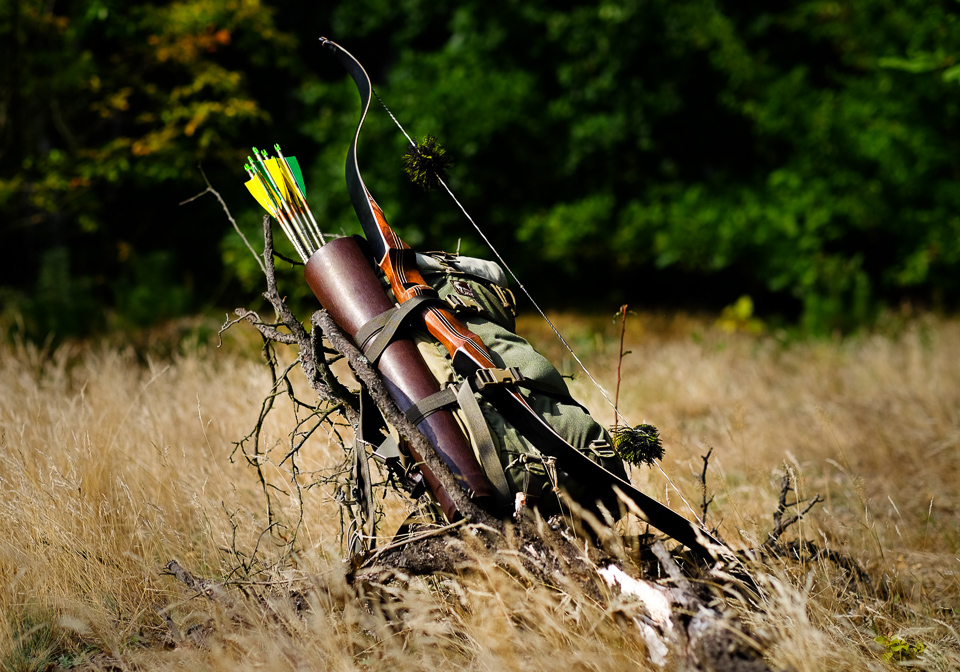
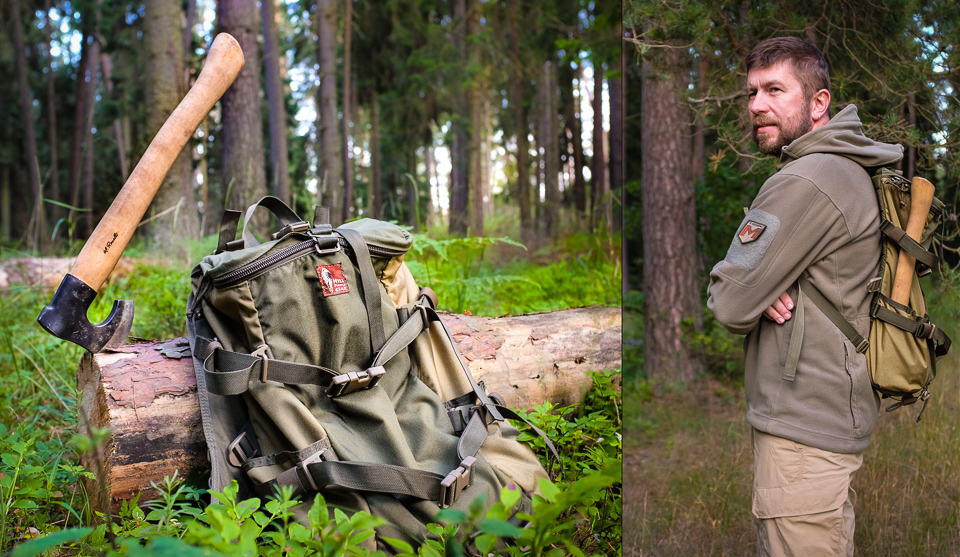
I was using this pack day-by-day during the entire 2015 season. It was usually as a 1-day pack for me and my kids when running through the forest around my country cabin. It also got used extensively as a daypack when hiking in wild forest-covered Bieszczady Mountains ,where we stayed for two weeks on the eastern border of European Union.
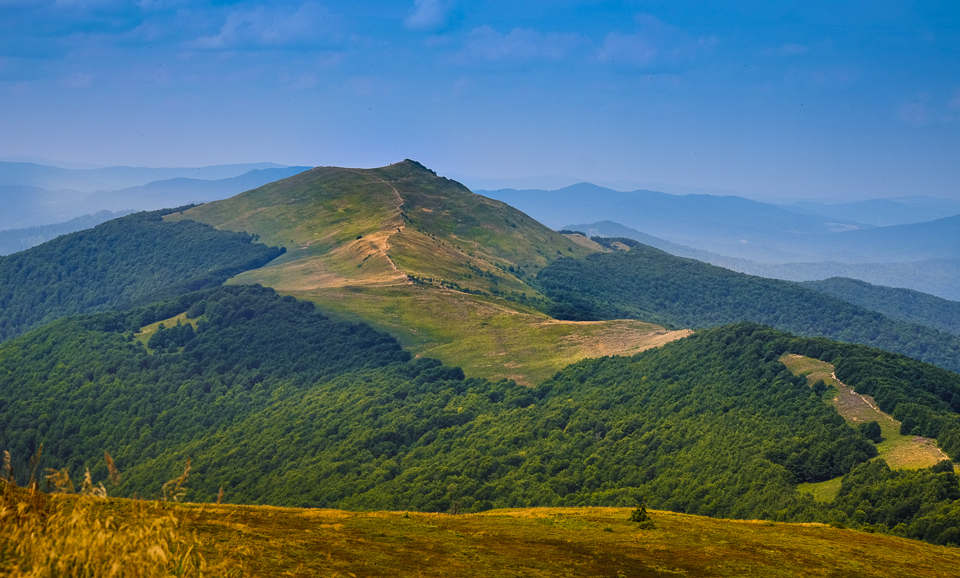
When hiking with my family I discovered another ‘funny’ advantage of the Umlindi. When wandering the whole day with my 4 year old son, sometimes I needed to carry him on my shoulders. Heavily padded straps of other packs are not the most convenient ‘seat’ for a little fellow, but the HPG flat harness fits him like a dream. On a side note, do you have kids? Teach them to explore nature when they are young. Show them the real world. If you start early, they’ll prefer mountaineering rather than Play Station. Family hiking is great!
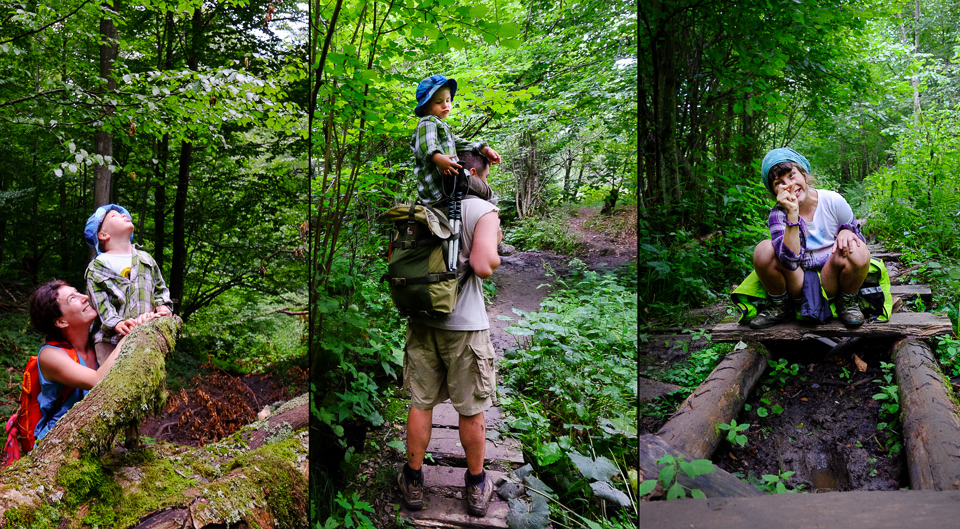
I also tried using the pack with much success as a classic 3-day-pack during a High Tatra Mountains photography trip in the south of Poland. I know that for some of you the idea of using such a small pack for 3 days may sound like stretching the Umlini a bit too far. However, thanks to the compression and carry straps I was easily able to pack quite a fair amount of stuff. The tent was actually not needed as I was sleeping in a mountain shelter with food supply available. That’s another reason why the Umlindi was a perfect choice for this trip.
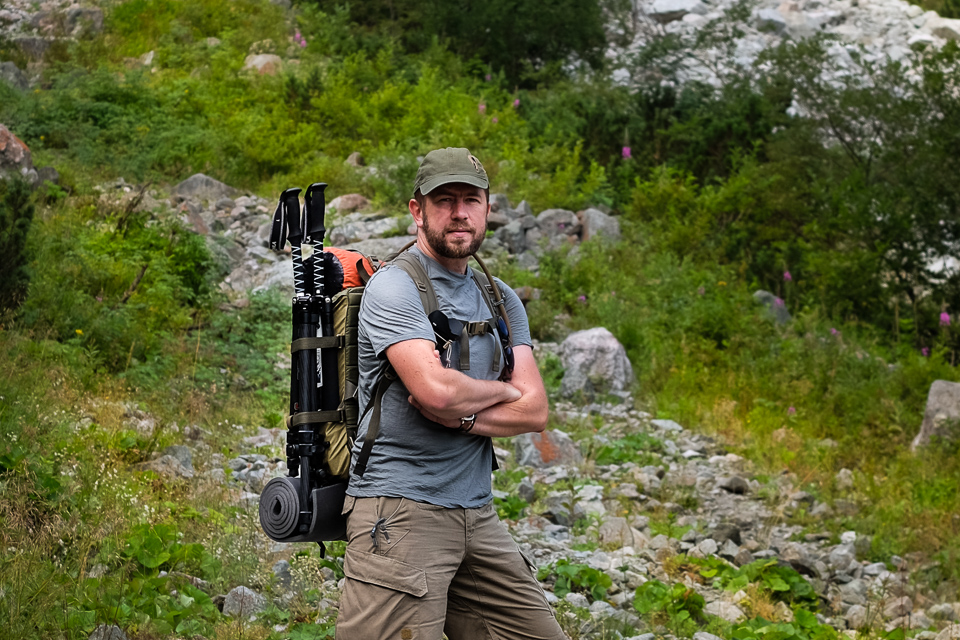
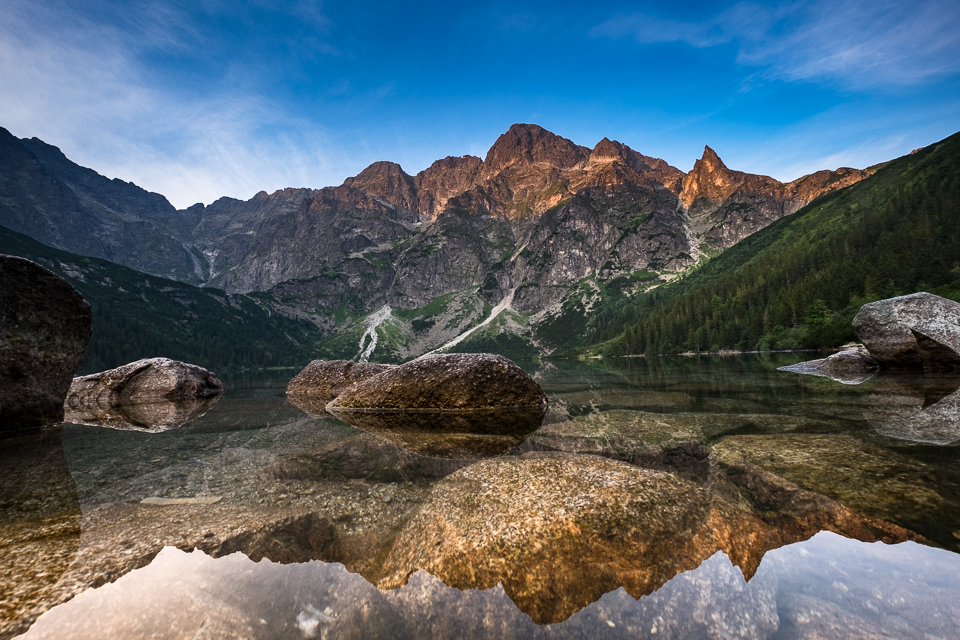
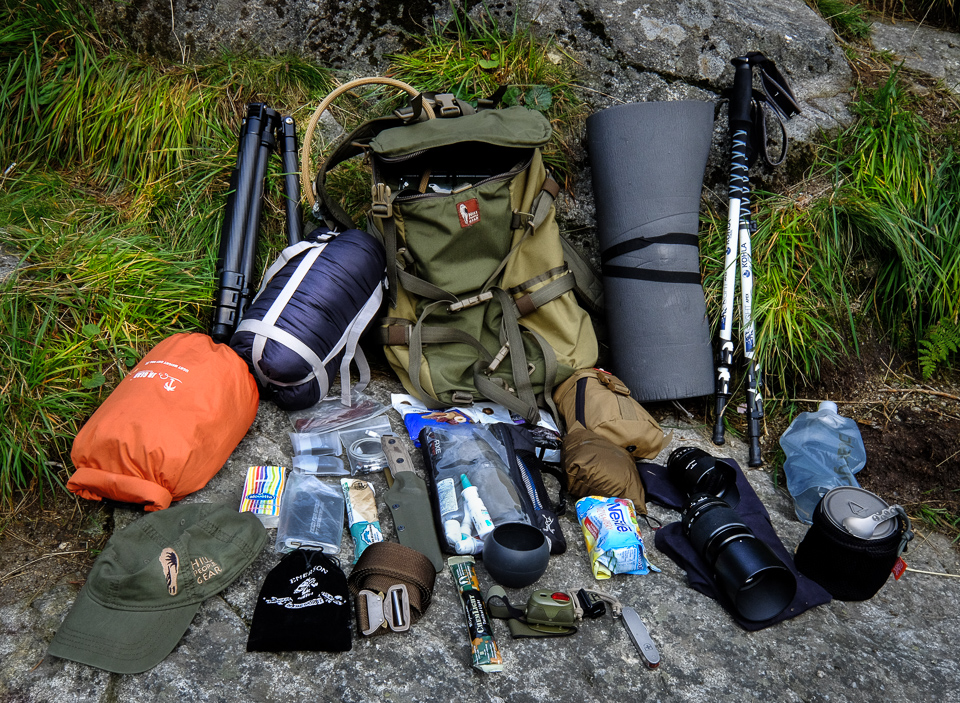
Gear List:
– Source hydration bladder
– sleeping pad
– ultralight hiking poles (Kohla Apex)
– carbon fiber tripod
– sleeping bag
– extra cloths (in the orange waterproof bag) including Fjallraven Barents Pro pants, Fjallraven fleece shirt, extra merino t-shirt, socks and underwear
– HPG cap
– wipes (always handy)
– power bank for iPhone
– spare batts (2) for camera
– Petzl Tactikka headlamp (lightweight and since it has a red filter it’s awesome accesory for night photography) with spare batteries
– Emerson “emergency flask” in protective bag
– Bayonet Belt
– Emerson fixed blade in kydex sheath
– mixed nuts, dried california plums, energy bars (energy)
– dried beef, children’s instant porridge (great stuff for hiking – lightweight to carry, and it’s protein, carbs and vitamin bomb)
– toiletries incl. microfiber towel (all in arcteryx dopp kit bag)
– Guyot silicone bowl (for many uses, usually to collect water from clean mountain streams)
– chemical light (last chance illuminating device, always works)
– custom Titanium Victorinox Farmer pocketknife (by ALM Knives & Tools)
– rain jacket (Outdoor Research ‘Helium 2’
– full medical / trauma kit in Mystery Ranch IFAK pouch
– additional Fuji Lenses (wide angle prime and tele-zoom)
– Ti mug with mini gas-burner, BIC lighter, Ti Spork and small isopropane screw-on canister hidden inside
– Platypus soft bottle (water backup)
Last but not least, lets talk about protection against elements. Regarding soil, rocks, bark, wood, bush, sticks, sand and other outdoor abrasives – they have been no problem at all for the Umlindi. I don’t usually baby my packs and still can’t find single scratch in the Cordura’s integrity. There is resin and dirt of course, especially after where I’ve been using it, but dirt is fine because my pack is just an outdoor tool for me. What about rain and water? Well, the Umlindi can surely survive light summer rain, but in the case of some more serious downpour – you’re out of luck. The weakness will be in the zippered area. There is a small flap added to create a barrier, the but zipper itself is not watertight. I’m sure your contents wouldn’t be completely wet as you can see from my photos I’ve used my pack in light rain and it was not a problem. I think it’s just more in line with other high-end, tactical Cordura packs. You can always use a standard rain cover available in any outdoor store if it called for rain in the forecast. Or, use a trick I learned from a professional SAR team member and a mountain guide: just put big, plastic trash-bag inside the pack body and put your stuff into it. It’s simple and works great. Not to mention, it’s considerably lighter than a rain cover and also protects your contents also from the bottom as well.
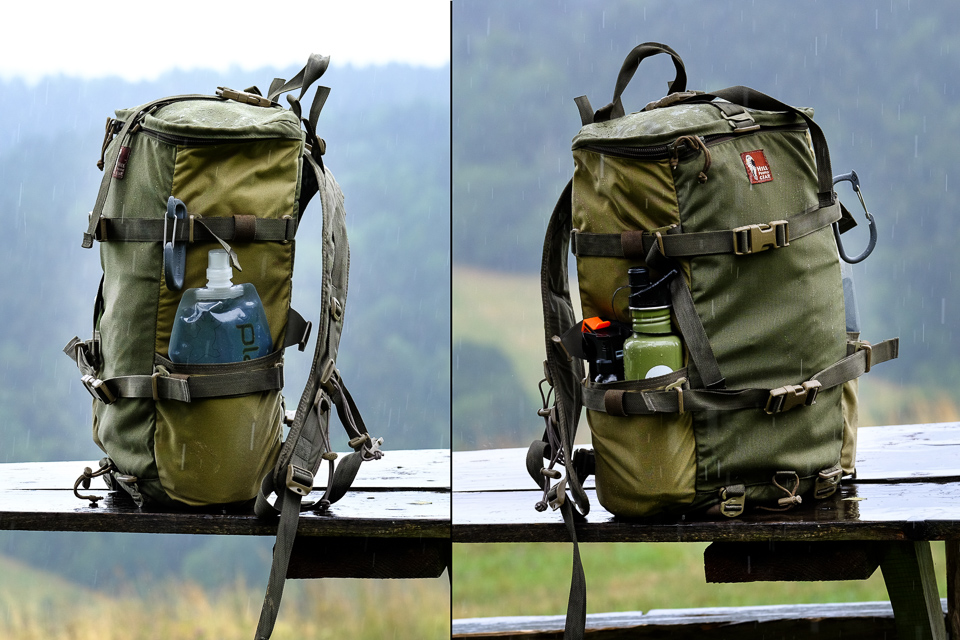
Are there any downsides of the Umlindi pack? Sure, as always, there is no such thing as a perfect pack! The first one is that the ventilation might be not good enough for some. If you sweat heavily, I would not recommend this pack for the middle of the summer. For me, it’s not an issue, but it all depends on personal preferences. The other disadvantage might be lack of internal organization. If you prefer zipper compartments inside than you either need to add admin pouch or just try different pack. However, keep in mind that each zippered pocket inside means you’re consuming space and adding more weight. For me, I personally think it’s a nice design feature and I actually like the simplicity. One other point is that if you like to carry your backpack on one shoulder only, you can forget the HPG harness. There are much better choices for city or fashion packs! This was designed to be a workhorse.
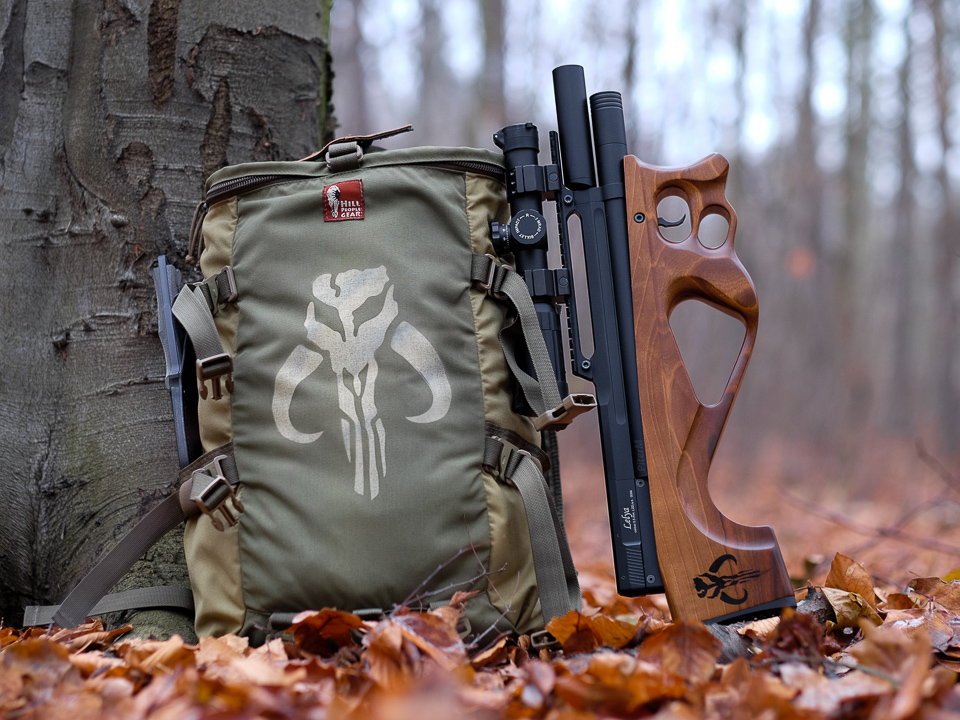
In conclusion, the Hill People Gear Umlindi is a great pack for all-round outdoor use. You have to get used to it at first, but as soon as you understand the concept behind the pack and the Hill brothers’ design philosophy, it’s hard to turn back! The list of advantages is too long to summarize in a single paragraph, but I think this review highlights many of them. Are there disadvantages? Sure, but you can work around them. With regards to durability, this pack is made to last a lifetime. They use premium materials are clearly don’t cut corners. The quality of First Spear manufacturing is most impressive, as you would expect. To get a Umlindi, you have to purchase it directly from Hill People Gear website. I know, it’s not a cheap pack, but it is worth every penny – every-single-penny! I highly recommended it! Also, it is also one of the coolest looking bags ever and super easy to customize and make your own. Check out the Star Wars Bounty Hunter logo (below) that I painted on my own bag. So grab a Umlindi, pack up your stuff, and try it out on your next adventure!
BTW, the Mandalorian's logo on my pack is my own "scentil & spray" work
(you can find my review also at Motus World adventure blog)
Now my review.... enjoy!
Hill People Gear (HPG) is a small company based in Western Colorado. It was founded by brothers Scot and Evan Hill. The Hills are real outdoorsmen, hunters, trappers, and backpackers. They’re also all around great guys who share their passion for designing and making awesome outdoor gear. While the Hills and Hill People Gear are best known for their iconic Kit Bags (chest pistol bags designed for outdoor use), they also have some other interesting packs in their portfolio.
The Umlindi pack (which Scot and Evan designed) is made entirely in United States by one of the most respected tactical nylon tailoring companies, First Spear. Knowing this alone, you can rest assured the quality of the Umlindi ($220) is top-notch and not compromised by cutting corners to reduce cost. That being said, be prepared to pony up as there is no such thing as a free lunch!

Packs with 20-30 liters of volume are probably the most crowded backpack segment. However, most of the packs follow almost the same construction principles. It’s a sack with two shoulder straps usually with some slight external design differences. So when I came across the Umlindi, which was really very different, I was even more than excited to try it out! This article discusses the pack from the perspective of a backpacker who enjoys the wilderness, mountains, and bushcraft. I also often have my two kids with me during summer family hikes. The Umlindi, which means ‘The Guardian’ in Zulu, was originally designed as a pack for a South African rhino poaching interdiction unit – something a little different from my adventures. If you want all the technical specs on the pack, you’ll find them here.

The big difference between Hill People Gear packs and everything else on the market is their harness system. In almost all of the other packs, you will find two separated shoulder straps attached to the pack. Hill People Gear decided to go with a one-piece super wide harness, which is connected to the pack at the top central part of the pack and goes around neck and shoulders. I had been carrying a HPG Tarahumara for about a year before getting the Umlindi. I already knew what to expect – pure comfort!

You don’t have to take just my word on it either. I’ve seen quite a few backpackers using other high-end packs upgraded with a HPG harness. The harness is not heavily padded, but it doesn’t need to be. It’s really wide and spreads the load out over the contact surface, which is considerably bigger than your standard shoulder straps. It all comes down to the physics. A bigger contact area equals lower pressure, which in turn equals less pounds per square inch. The end result of the equation is comfort! The HPG harness includes an adjustable sternum strap and two shock-cord loops on each shoulder (dedicated to carry small items like 0.5 L bottle or energy gel). I use them also for my camera lenses – that gives me quick one-hand access to change my lens on the fly, and it rides really secured. Of course, you have to check it out and decide for yourself.

The pack itself has a simple but well thought-out construction. It’s a medium-sized sack with just one small internal pocket (which is good for flashlight, spork, energy bars and other quick access items). It is fitted with flat lid and heavy-duty zippered closing. The internal flat pocket is just an open slot. In fact, I don’t recommend it for wallet or other valuables as they may come out. There are two side pockets on the outside of the pack which are dedicated for water bottles, a knife, small hatchet, folding saw, kindling, etc. They are big enough even for 1-QT USGI canteen. Still though, I prefer the lightweight, flat collapsible bottles like the ones Platypus or GSI that don’t push or protrude to the inside along with compromising critical internal storage volume.
All in all, think of the pack as a modern interpretation of a classic klettersack with some additional features and solutions. Inside, on the back, you will easily notice polymer frame sheet with aluminum central stay, which can be bent anatomically to fit your back. There is also a set of 4 internal attachment loops for admin pockets and/or water bladder and hydration port. Pro-tip: with a pair of grimlocks you can comfortably attach admin pouch inside, which gives you all organization you may need. The Kifaru Admin Pouch works best for me.

The back of the pack is also as simple as it gets. It’s just a hypalon reinforced lumbar area and flat back with some padding, behind which you’ll find one big, flat pocket. The pocket can be used for flat quick-access items such as maps or working gloves. You could even add a short lever-action rifle. I’ll take a Grizzly Custom “The Backpacker Scout” in classic 30-30, please! The lightly padded flat back panel, combined with the unique HPG harness, works surprisingly good as a team in my opinion.

The pack’s ventilation is not perfect of course, but this kind of suspension keeps the pack’s center of gravity close to the back, which is something that I like a lot. In my last 30 years of my hiking, backpacking, and scouting experience, I found one universal truth – in a hot summer day, no ventilation is ever good enough. You’re going to sweat. For me, in a pack of this size, ventilation is not the key priority, overall comfort and compactness is. If the weather demands any additional layers over my merino t-shirt, the issue disappears completely and is a moot point. So I see it as a conscious design choice. It is a modern Klettersack, remember?

In the lumbar area, there is a dedicated space for a standard velcro-backed waist belt. HPG offers really nice add-on called the Prairie Belt. However, this is my ‘fast-n-light’ pack so I decided to go without the waist belt. I don’t regret it either as the wide harness distributes the pack’s weight comfortably on my shoulders. Plus, without the waist belt, I have surely better ventilation of my back as well. Again, keep in mind that it’s a small pack. I don’t expect more than 25 lbs on my back when carrying it, and usually it’s up only to 15 lbs.

Here we get to the key point! The one feature, which really sets this pack apart, is the compression strap system. It’s a FULL SYSTEM, not just your old Klettersack side straps. It starts with a single adjustable strap on top of the pack with a side-release ‘Fastex’ buckle on one side and G-hook plus small keeper on the other. It can be used to strap on a rolled jacket or hat, but I use it often to strap down a 5L waterproof bag with a fleece jacket and merino shirt rolled inside.

On the bottom of the pack you’ll find a pair of straps with webbing keepers and metal G-hooks (strong and low profile). They are long enough to strap a sleeping pad, small tent or a tarp to the pack. There is also a small adjustable paracord loop at the bottom to attach an ice-hatchet or similar ice climbing tool, which you can then secure with main strap. It would work for a tomahawk as well. Last but not least, there are no drain holes! In my years of experience, they usually just let water in.

The main compression straps are genius! The unique construction allows you to use the side compressions independently from the back compression sections, but it’s still just ONE long strap. Via a combined system of G-Hooks, loops, and Fastex buckles, you can set the compression/tension of each section separately. Of, if your needs are different, you can combine two sections or all three sections together to strap even the biggest items to your pack. I managed to secure with side straps: water bottles, hiking poles, camera tripod (full size), crampons, all sorts of sticks, side pouches, rolled hardshell, and even a 2-lb outdoor axe. Also, it was no problem with bigger items such as full size recurve bow and quiver, 10-inch Chris Reeve bush knife, and even a bullpup carbine. With the flexibility of multiple configurations, this is the best compression straps system I’ve ever had on any pack!



I was using this pack day-by-day during the entire 2015 season. It was usually as a 1-day pack for me and my kids when running through the forest around my country cabin. It also got used extensively as a daypack when hiking in wild forest-covered Bieszczady Mountains ,where we stayed for two weeks on the eastern border of European Union.

When hiking with my family I discovered another ‘funny’ advantage of the Umlindi. When wandering the whole day with my 4 year old son, sometimes I needed to carry him on my shoulders. Heavily padded straps of other packs are not the most convenient ‘seat’ for a little fellow, but the HPG flat harness fits him like a dream. On a side note, do you have kids? Teach them to explore nature when they are young. Show them the real world. If you start early, they’ll prefer mountaineering rather than Play Station. Family hiking is great!

I also tried using the pack with much success as a classic 3-day-pack during a High Tatra Mountains photography trip in the south of Poland. I know that for some of you the idea of using such a small pack for 3 days may sound like stretching the Umlini a bit too far. However, thanks to the compression and carry straps I was easily able to pack quite a fair amount of stuff. The tent was actually not needed as I was sleeping in a mountain shelter with food supply available. That’s another reason why the Umlindi was a perfect choice for this trip.



Gear List:
– Source hydration bladder
– sleeping pad
– ultralight hiking poles (Kohla Apex)
– carbon fiber tripod
– sleeping bag
– extra cloths (in the orange waterproof bag) including Fjallraven Barents Pro pants, Fjallraven fleece shirt, extra merino t-shirt, socks and underwear
– HPG cap
– wipes (always handy)
– power bank for iPhone
– spare batts (2) for camera
– Petzl Tactikka headlamp (lightweight and since it has a red filter it’s awesome accesory for night photography) with spare batteries
– Emerson “emergency flask” in protective bag
– Bayonet Belt
– Emerson fixed blade in kydex sheath
– mixed nuts, dried california plums, energy bars (energy)
– dried beef, children’s instant porridge (great stuff for hiking – lightweight to carry, and it’s protein, carbs and vitamin bomb)
– toiletries incl. microfiber towel (all in arcteryx dopp kit bag)
– Guyot silicone bowl (for many uses, usually to collect water from clean mountain streams)
– chemical light (last chance illuminating device, always works)
– custom Titanium Victorinox Farmer pocketknife (by ALM Knives & Tools)
– rain jacket (Outdoor Research ‘Helium 2’
– full medical / trauma kit in Mystery Ranch IFAK pouch
– additional Fuji Lenses (wide angle prime and tele-zoom)
– Ti mug with mini gas-burner, BIC lighter, Ti Spork and small isopropane screw-on canister hidden inside
– Platypus soft bottle (water backup)
Last but not least, lets talk about protection against elements. Regarding soil, rocks, bark, wood, bush, sticks, sand and other outdoor abrasives – they have been no problem at all for the Umlindi. I don’t usually baby my packs and still can’t find single scratch in the Cordura’s integrity. There is resin and dirt of course, especially after where I’ve been using it, but dirt is fine because my pack is just an outdoor tool for me. What about rain and water? Well, the Umlindi can surely survive light summer rain, but in the case of some more serious downpour – you’re out of luck. The weakness will be in the zippered area. There is a small flap added to create a barrier, the but zipper itself is not watertight. I’m sure your contents wouldn’t be completely wet as you can see from my photos I’ve used my pack in light rain and it was not a problem. I think it’s just more in line with other high-end, tactical Cordura packs. You can always use a standard rain cover available in any outdoor store if it called for rain in the forecast. Or, use a trick I learned from a professional SAR team member and a mountain guide: just put big, plastic trash-bag inside the pack body and put your stuff into it. It’s simple and works great. Not to mention, it’s considerably lighter than a rain cover and also protects your contents also from the bottom as well.

Are there any downsides of the Umlindi pack? Sure, as always, there is no such thing as a perfect pack! The first one is that the ventilation might be not good enough for some. If you sweat heavily, I would not recommend this pack for the middle of the summer. For me, it’s not an issue, but it all depends on personal preferences. The other disadvantage might be lack of internal organization. If you prefer zipper compartments inside than you either need to add admin pouch or just try different pack. However, keep in mind that each zippered pocket inside means you’re consuming space and adding more weight. For me, I personally think it’s a nice design feature and I actually like the simplicity. One other point is that if you like to carry your backpack on one shoulder only, you can forget the HPG harness. There are much better choices for city or fashion packs! This was designed to be a workhorse.

In conclusion, the Hill People Gear Umlindi is a great pack for all-round outdoor use. You have to get used to it at first, but as soon as you understand the concept behind the pack and the Hill brothers’ design philosophy, it’s hard to turn back! The list of advantages is too long to summarize in a single paragraph, but I think this review highlights many of them. Are there disadvantages? Sure, but you can work around them. With regards to durability, this pack is made to last a lifetime. They use premium materials are clearly don’t cut corners. The quality of First Spear manufacturing is most impressive, as you would expect. To get a Umlindi, you have to purchase it directly from Hill People Gear website. I know, it’s not a cheap pack, but it is worth every penny – every-single-penny! I highly recommended it! Also, it is also one of the coolest looking bags ever and super easy to customize and make your own. Check out the Star Wars Bounty Hunter logo (below) that I painted on my own bag. So grab a Umlindi, pack up your stuff, and try it out on your next adventure!
BTW, the Mandalorian's logo on my pack is my own "scentil & spray" work
(you can find my review also at Motus World adventure blog)
Last edited:

